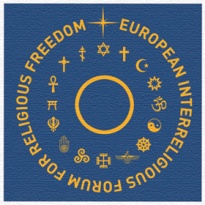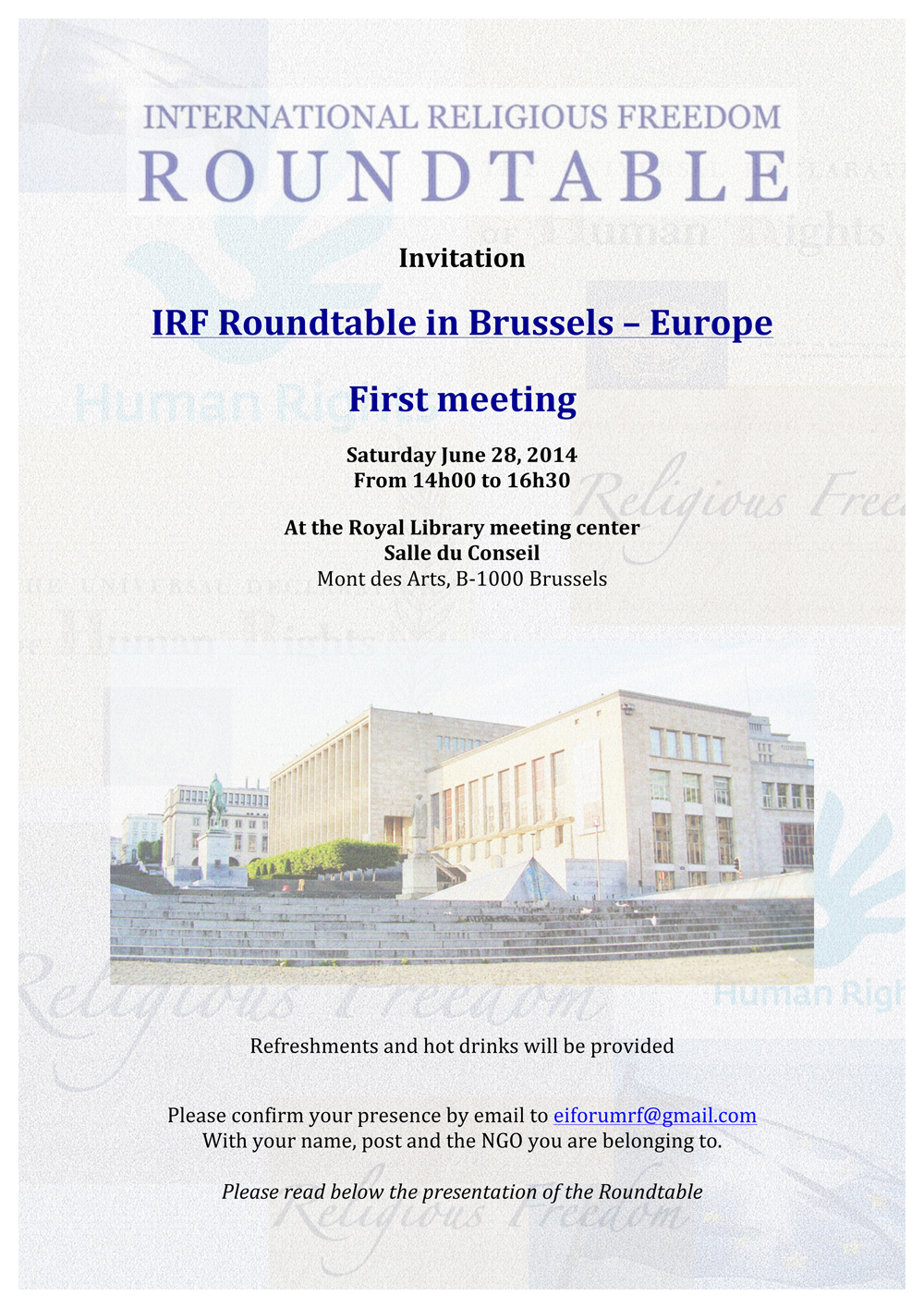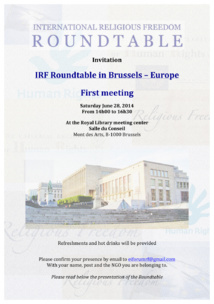This first meeting will be co-chaired by Dr. phil. Thomas Schirrmacher, Director, International Institute for Religious Freedom (Bonn, Cape Town, Colombo), and Eric Roux, Chairperson, EIFRF.
Please confirm your presence by email to eiforumrf@gmail.com
With your name, post and the NGO you are belonging to.
Please read below the presentation of the Roundtable
Presentation of the Roundtable:
The IRF Roundtable (IRF = International Religious Freedom) is an informal group of individuals from non-governmental organisations who gather regularly to discuss IRF issues on a non-attribution basis. It is simply a safe space where participants gather, speak freely in sharing ideas and information, and propose joint advocacy actions to address specific IRF issues and problems.
An IRF Roundtable has already operated in Washington DC for more than 3 years with good results with an average attendance of over 70 participants from civil society and government (see addendum). The Roundtable in Brussels will be the second of its kind to operate in the world.
The purpose is to have a roundtable meeting every two months in Brussels. Meetings will be open to all civil society members and every NGO that share concerns about religious freedom issues and are committed to Article 18 of the Universal Declaration of Human Rights. The non-attribution basis means that if a report of the discussions during the meetings is done, no specific quote or position will be attributed to anyone, making the roundtable a safe space for expressing views and sharing ideas.
The goal of the Roundtable is to reverse the rising tide of restrictions on religious freedom that is spreading across the world (including Europe) – 75 per cent of the world’s approximately 7 billion people now live in countries with high government restrictions on religion and/or high social hostilities involving religion, up from 70 per cent just one year earlier (Pew Forum on Religion & Public Life).
Even if many initiatives, coalitions and advocacy groups already exist and operate in this field, the IRF roundtable aims to complement other existing activities and does not encroach on their existing fields of action:
• It is a “non-organisation” and participants do not commit themselves by participating and their choice to join any given advocacy action is self determined.
• It’s open to all and will permit some “non-traditional”, minority or less-organised faiths to be able to make their voices heard, as well as to propose joint advocacy actions in some fields that have not yet been addressed by existing initiatives.
• It will allow existing initiatives and NGOs to participate and broaden their grassroots, field-based knowledge of different issues, by being briefed and alerted on topics that have not always been tackled before (or different aspects or updates on topics that have).
• It will allow participants to join others with regards to specific issues whereas they would never have had such an opportunity to work together in different circumstances.
At the first meeting of the IRF Roundtable in Brussels, we will do a presentation of it and discuss together the possible ways of organising this roundtable and making it perennial. We will also work with the participants to find out what they would expect from such an initiative in order to adapt it to meet their specific concerns.
Modus Operandi
Each individual participant has a standing invitation to serve on the steering committee; and an open and equal opportunity to place specific items on the agenda, speak at meetings, design and launch initiatives, self-select into coalitions of the willing and participate in joint advocacy actions. And we are truly multi-faith in nature. While there is very little we agree on theologically, we all agree on the importance of religious freedom, and we work together on the basis of mutual respect and understanding. Participants are under no obligation to take any action whatsoever. And each joint, multi-faith advocacy action is undertaken solely by, and on behalf of, the individual participants who self-selected into that specific coalition of the willing.
The primary purpose of the Roundtable is to advance IRF by:
1. Engaging different European institutions (in its broadest sense, which would include the Council of Europe and the OSCE) to make religious freedom a priority issue in order that:
a. Religious freedom issues are fully integrated into European policies, including democratic promotion, public diplomacy, counterterrorism, and multilateral strategies.
b. The tools of European institutions are used to advance religious freedom around the world as well as in Europe.
c. Political and cultural institutions necessary to advance religious freedom are continually supported, facilitated, and protected at home and abroad.
d. Global levels of religious intolerance, discrimination, persecution, terrorism and instability are significantly reduced.
2. Engaging with civil society leaders, other governments that protect and promote religious freedom and multilateral, intergovernmental institutions to coordinate joint advocacy efforts.
3. Engaging in meaningful dialogues with governments that restrict religious freedom.
While participants of the Roundtable continue to engage European governmental institutions to do more to advance religious freedom internationally and work with them when and where it will help, we will not rely on or wait for this to achieve our goals. Rather, participants should also reach out directly to other governments and engage in meaningful dialogues that have already been or will be independently developed with ambassadors, embassies and delegations. Indeed, these are manifestations of “bottom-up” civil society engaging the “top-down” of authoritarian governments.
The IRF Roundtable (IRF = International Religious Freedom) is an informal group of individuals from non-governmental organisations who gather regularly to discuss IRF issues on a non-attribution basis. It is simply a safe space where participants gather, speak freely in sharing ideas and information, and propose joint advocacy actions to address specific IRF issues and problems.
An IRF Roundtable has already operated in Washington DC for more than 3 years with good results with an average attendance of over 70 participants from civil society and government (see addendum). The Roundtable in Brussels will be the second of its kind to operate in the world.
The purpose is to have a roundtable meeting every two months in Brussels. Meetings will be open to all civil society members and every NGO that share concerns about religious freedom issues and are committed to Article 18 of the Universal Declaration of Human Rights. The non-attribution basis means that if a report of the discussions during the meetings is done, no specific quote or position will be attributed to anyone, making the roundtable a safe space for expressing views and sharing ideas.
The goal of the Roundtable is to reverse the rising tide of restrictions on religious freedom that is spreading across the world (including Europe) – 75 per cent of the world’s approximately 7 billion people now live in countries with high government restrictions on religion and/or high social hostilities involving religion, up from 70 per cent just one year earlier (Pew Forum on Religion & Public Life).
Even if many initiatives, coalitions and advocacy groups already exist and operate in this field, the IRF roundtable aims to complement other existing activities and does not encroach on their existing fields of action:
• It is a “non-organisation” and participants do not commit themselves by participating and their choice to join any given advocacy action is self determined.
• It’s open to all and will permit some “non-traditional”, minority or less-organised faiths to be able to make their voices heard, as well as to propose joint advocacy actions in some fields that have not yet been addressed by existing initiatives.
• It will allow existing initiatives and NGOs to participate and broaden their grassroots, field-based knowledge of different issues, by being briefed and alerted on topics that have not always been tackled before (or different aspects or updates on topics that have).
• It will allow participants to join others with regards to specific issues whereas they would never have had such an opportunity to work together in different circumstances.
At the first meeting of the IRF Roundtable in Brussels, we will do a presentation of it and discuss together the possible ways of organising this roundtable and making it perennial. We will also work with the participants to find out what they would expect from such an initiative in order to adapt it to meet their specific concerns.
Modus Operandi
Each individual participant has a standing invitation to serve on the steering committee; and an open and equal opportunity to place specific items on the agenda, speak at meetings, design and launch initiatives, self-select into coalitions of the willing and participate in joint advocacy actions. And we are truly multi-faith in nature. While there is very little we agree on theologically, we all agree on the importance of religious freedom, and we work together on the basis of mutual respect and understanding. Participants are under no obligation to take any action whatsoever. And each joint, multi-faith advocacy action is undertaken solely by, and on behalf of, the individual participants who self-selected into that specific coalition of the willing.
The primary purpose of the Roundtable is to advance IRF by:
1. Engaging different European institutions (in its broadest sense, which would include the Council of Europe and the OSCE) to make religious freedom a priority issue in order that:
a. Religious freedom issues are fully integrated into European policies, including democratic promotion, public diplomacy, counterterrorism, and multilateral strategies.
b. The tools of European institutions are used to advance religious freedom around the world as well as in Europe.
c. Political and cultural institutions necessary to advance religious freedom are continually supported, facilitated, and protected at home and abroad.
d. Global levels of religious intolerance, discrimination, persecution, terrorism and instability are significantly reduced.
2. Engaging with civil society leaders, other governments that protect and promote religious freedom and multilateral, intergovernmental institutions to coordinate joint advocacy efforts.
3. Engaging in meaningful dialogues with governments that restrict religious freedom.
While participants of the Roundtable continue to engage European governmental institutions to do more to advance religious freedom internationally and work with them when and where it will help, we will not rely on or wait for this to achieve our goals. Rather, participants should also reach out directly to other governments and engage in meaningful dialogues that have already been or will be independently developed with ambassadors, embassies and delegations. Indeed, these are manifestations of “bottom-up” civil society engaging the “top-down” of authoritarian governments.
Addendum: organisations informally represented at the Washington DC Roundtable:
· Advocates International
· Ahmadiyya Movement in Islam USA
· Ahmadiyya Muslim Community
· American Center for Law & Justice
· American Humanist Association
· American Islamic Congress
· American Jewish Committee
· American-Arab Anti-Discrimination Committee
· American NGO Coalition for the ICC
· America's Unofficial Ambassadors
· Amnesty International
· Anti-Defamation League
· B’nai B'rith International
· Bahá'ís of the United States
· Baptist World Alliance
· Becket Fund for Religious Liberty
· Center for American Progress
· Center for the Study of Islam & Democracy
· Christian Solidarity Worldwide UK
· Christian Solidarity Worldwide USA
· Church of Scientology
· Church World Service
· Community of Sant'egidio
· Council on American-Islamic Relations
· Episcopal Church in the United States of America
· Ethics and Public Policy Center
· Evangelical Lutheran Church in America
· Falun Gong Community
· First Freedom Center
· Freedom House
· Friends of America
· Frontline Missions
· Full Circle Partners
· Greater Annapolis Interfaith Network
· Hebrew Immigrant Aid Society
· Henry Jackson Society
· Hindu American Foundation
· Homer International Law
· Hudson Institute
· Human Friends Organization International
· Human Rights First
· Human Rights Law Foundation
· Human Rights Watch
· Institute for Global Engagement
· International Campaign for Tibet
· International Center for Religion & Diplomacy
· International Christian Concern
· International Coalition for Religious Freedom
· International Institute for Religious Freedom
· International Justice Mission
· International Religious Liberty Association
· International Society for Krishna Consciousness
· Islamic Relief USA
· Jubilee Campaign
· Kurdish Human Rights Watch
· Law & Liberty Trust
· Liberty Coalition
· Lutheran Immigration and Refugee Service
· Macedonian Orthodox Church American–Canadian Diocese
· Muslim Public Affairs Council
· National Association of Evangelicals
· Network of Azerbaijani-Americans from Iran
· New Century Evangelicals Project at Faith in Public Life
· North American Religious Liberty Association
· Northland – A Church Distributed
· Open Doors USA
· Religious Action Center of Reform Judaism
· Religious Freedom Project at the Berkley Center for Religion, Peace, & World Affairs
· Religious Liberty Partnership
· Rumi Forum
· Russian Orthodox Autonomous Church
· Secular Coalition for America
· Seventh-day Adventist Church
· Shia Rights Watch
· Shoulder-to-Shoulder Campaign
· Sojourners
· Sudan Sunrise
· The Becket Fund for Religious Liberty
· The Church of Jesus Christ of Latter-day Saints
· The Ethics & Religious Liberty Commission of the Southern Baptist Convention
· The Institute for Gilgit Baltistan Studies
· The Institute on Religion & Public Policy
· The Mitchell Firm
· The Westminster Institute
· Turkic American Alliance
· U.S. Conference of Catholic Bishops
· Union of Councils for Jews of the Former Soviet Union
· United Methodist Church, General Board of Church and Society
· United Macedonian Diaspora
· United Sikhs
· Uyghur American Association
· Voice of America
· World Evangelical Alliance
· World Relief
• World Vision









 FoRB Roundtable's online meeting with ODIHR on 11 December
FoRB Roundtable's online meeting with ODIHR on 11 December